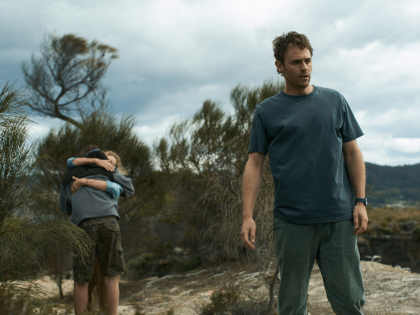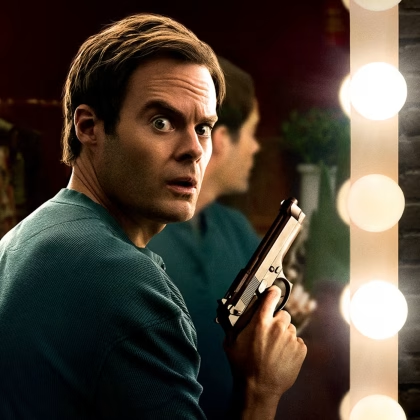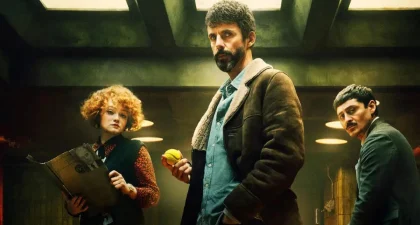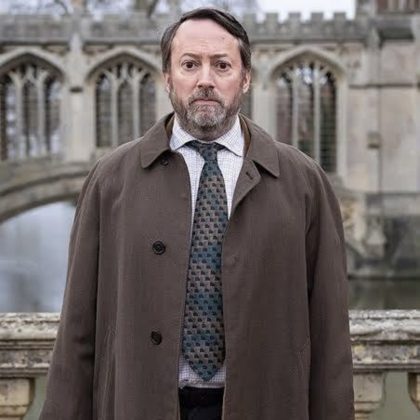 For all of you who dig Australian murder mysteries, Netflix has another good one for you. The Survivors takes place in a small town in Tasmania and the difference in this series is the focus isn’t on the police, it’s on the town’s residents.
For all of you who dig Australian murder mysteries, Netflix has another good one for you. The Survivors takes place in a small town in Tasmania and the difference in this series is the focus isn’t on the police, it’s on the town’s residents.
Evelyn Bay has a lot of secrets. A lot. And they all seemed to start fifteen years ago when three young people were lost at sea during a terrible storm. Two of them were hailed as heroes, as they died trying to save their friend, Kieran, who survived. Now, fifteen years later, adult Kieran, played by Charlie Vickers, has returned to Evelyn Bay for the anniversary memorial commemorating the tragedy. Oh, did I  forget to mention that one of the boys who died trying to save him was his own brother, Finn. So, part of the drama that Kieran is coming home to is the fact that his mother, Verity, played by Robyn Malcolm, has never truly forgiven Kieran for being responsible for Finn’s death. And, of course, the rest of the town also blames Kieran for what happened that night, which is why he ran off to Sydney right after and hasn’t been back since.
forget to mention that one of the boys who died trying to save him was his own brother, Finn. So, part of the drama that Kieran is coming home to is the fact that his mother, Verity, played by Robyn Malcolm, has never truly forgiven Kieran for being responsible for Finn’s death. And, of course, the rest of the town also blames Kieran for what happened that night, which is why he ran off to Sydney right after and hasn’t been back since.

 Well, it’s 2025, which means we’re at the quarter-century mark, so everyone is posting their lists of their favorite films from 2000-2024, so I’ve decided to jump on the bandwagon and add mine to the parade.
Well, it’s 2025, which means we’re at the quarter-century mark, so everyone is posting their lists of their favorite films from 2000-2024, so I’ve decided to jump on the bandwagon and add mine to the parade.  It’s hard to imagine now, but there was a time when former Saturday Night Live cast members just could not get any traction at all in TV or movies after they left the iconic late-night show. There was the occasional exception, but for the most part, former SNL cast members’ careers ended up dying a slow death, despite many, many attempts at finding Eddie Murphy-like glory. In the nineties, it became somewhat of a sad joke that if you were on SNL, that meant your career had peaked.
It’s hard to imagine now, but there was a time when former Saturday Night Live cast members just could not get any traction at all in TV or movies after they left the iconic late-night show. There was the occasional exception, but for the most part, former SNL cast members’ careers ended up dying a slow death, despite many, many attempts at finding Eddie Murphy-like glory. In the nineties, it became somewhat of a sad joke that if you were on SNL, that meant your career had peaked. and Ted Lasso. And we saw it with Bill Hader and a show called Barry, one of the best television shows produced in the last twenty years.
and Ted Lasso. And we saw it with Bill Hader and a show called Barry, one of the best television shows produced in the last twenty years.  Don’t be put off by the title. Murderbot, a new series on AppleTV+, is sci-fi, but it’s a comedy, not an apocalyptic, Terminator-type vision of our near-future where machines destroy humanity. Of course, as of this writing, only seven of the ten episodes of season one have dropped, so who knows what could happen. BUT, for what I’ve seen so far of Murderbot, it is a delightful, even goofy at times, warm and endearingly offbeat comedy about a service robot who has gained free will, and every indication is that it won’t go rogue like its main character.
Don’t be put off by the title. Murderbot, a new series on AppleTV+, is sci-fi, but it’s a comedy, not an apocalyptic, Terminator-type vision of our near-future where machines destroy humanity. Of course, as of this writing, only seven of the ten episodes of season one have dropped, so who knows what could happen. BUT, for what I’ve seen so far of Murderbot, it is a delightful, even goofy at times, warm and endearingly offbeat comedy about a service robot who has gained free will, and every indication is that it won’t go rogue like its main character. the other, more polished, newer robots. That’s because he’s been refurbished—something happened in his past that had to be wiped from his memory, maybe this is where the series title comes from? Hmmm. But this is where the “glitch” may have happened that prompted our loveable sec unit to gain self-awareness. And it is here where Murderbot gains all of its momentum.
the other, more polished, newer robots. That’s because he’s been refurbished—something happened in his past that had to be wiped from his memory, maybe this is where the series title comes from? Hmmm. But this is where the “glitch” may have happened that prompted our loveable sec unit to gain self-awareness. And it is here where Murderbot gains all of its momentum. The premise of conquering the beast has been around as long as storytelling has captured human imagination. Myths, fairy tales, superhero sagas, they all tell tales of ordinary men and women going up against an unconquerable foe, armed only with their courage, wit and, more often than not, immeasurable luck.
The premise of conquering the beast has been around as long as storytelling has captured human imagination. Myths, fairy tales, superhero sagas, they all tell tales of ordinary men and women going up against an unconquerable foe, armed only with their courage, wit and, more often than not, immeasurable luck.  I heard the latest Netflix series sensation Dept. Q described as a cross between Slow Horses and House. Now, if you know anything about those two other beloved but decidedly un-traditional shows, one which ran from 2004 to 2012 and the other which is currently running on AppleTV+, they both are centered around one certifiably grumpy guy who also happens to be—of course—somewhat of a genius at what he does, despite how he makes everyone around him crazy. In House, the crazy-maker was played by the always-perfect
I heard the latest Netflix series sensation Dept. Q described as a cross between Slow Horses and House. Now, if you know anything about those two other beloved but decidedly un-traditional shows, one which ran from 2004 to 2012 and the other which is currently running on AppleTV+, they both are centered around one certifiably grumpy guy who also happens to be—of course—somewhat of a genius at what he does, despite how he makes everyone around him crazy. In House, the crazy-maker was played by the always-perfect I was in the mood for action again, so I looked around for a show that could scratch my itch and I found one that did just that. It’s not the typical kind of action, there aren’t car chases or spy shenanigans, but there are explosions and tension galore. If you are looking for a show that will keep you fully engaged, on the edge of your seat and never once bored enough to look at your phone, Trigger Point on Peacock and BritBox is the show for you.
I was in the mood for action again, so I looked around for a show that could scratch my itch and I found one that did just that. It’s not the typical kind of action, there aren’t car chases or spy shenanigans, but there are explosions and tension galore. If you are looking for a show that will keep you fully engaged, on the edge of your seat and never once bored enough to look at your phone, Trigger Point on Peacock and BritBox is the show for you. Hurt Locker, which won the Oscar for Best Picture back in 2008, except without war, the desert or all that testosterone.
Hurt Locker, which won the Oscar for Best Picture back in 2008, except without war, the desert or all that testosterone.  Netflix’s first Canadian original series has arrived and it’s a winner. North of North is a half-hour comedy series starring Anna Lambe as Siaja, a twenty-six-year-old Inuk woman in the small fictional town of Ice Cove in the province of Nunavut in the Canadian Arctic, the largest and northernmost territory of Canada. Siaja is having a bit of an identity crisis and wants desperately to break out of the rut she’s in, starting with her marriage to a self-absorbed husband, who happens to be the most popular guy in town. But breaking away from her husband, who is also the father of her young daughter, won’t be easy, and neither
Netflix’s first Canadian original series has arrived and it’s a winner. North of North is a half-hour comedy series starring Anna Lambe as Siaja, a twenty-six-year-old Inuk woman in the small fictional town of Ice Cove in the province of Nunavut in the Canadian Arctic, the largest and northernmost territory of Canada. Siaja is having a bit of an identity crisis and wants desperately to break out of the rut she’s in, starting with her marriage to a self-absorbed husband, who happens to be the most popular guy in town. But breaking away from her husband, who is also the father of her young daughter, won’t be easy, and neither I know, I know, another British detective show. Is it my fault that detective shows are all the Brits seem to make? And is it my fault that they all are so good?
I know, I know, another British detective show. Is it my fault that detective shows are all the Brits seem to make? And is it my fault that they all are so good?